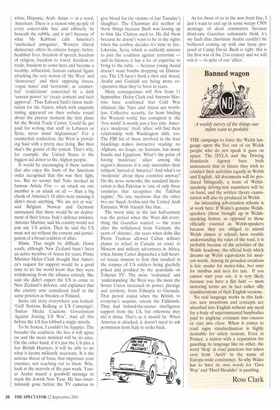Banned wagon
A weekly survey of the things our rulers want to prohibit
THE campaign to force the Welsh language upon the five out of six Welsh people who do not speak it goes on apace. The DVLA and the Driving Standards Agency have both announced that in future they wish to conduct their activities equally in Welsh and English. All documents will be produced bilingually, a team of Welshspeaking driving-test examiners will be on hand, and the written theory examination will also be produced in Welsh.
An interesting job-creation scheme is at work here. If Wales's genuine Welshspeakers (those brought up in Welshspeaking homes, as opposed to those officially counted as Welsh-speakers because they are obliged to attend Welsh classes at school) have trouble understanding the rules of the road, it is probably because of the activities of the Welsh Academy, the official body which dreams up Welsh equivalents for modern words. Among its proudest creations is Ire* modur for motor-bike, bws mini for minibus and tacsi for taxi. If you cannot start your ceir, it is very likely because you have a flat batri — most motoring terms are in fact rather silly transliterations of their English versions.
No real language works in this fashion: new inventions and concepts are absorbed into English without any need for a body of superannuated busybodies paid to anglicise croissant into crusson or ciao into chow. When it comes to road signs standardisation is highly desirable for safety reasons. Even in France, a nation with a reputation for guarding its language like no other, the word 'Stop' at road junctions has taken over from 'Ante in the name of Europe-wide consistency. So why Wales has to have its own words for 'Give Way' and 'Hard Shoulder' is puzzling.
Ross Clark










































































 Previous page
Previous page